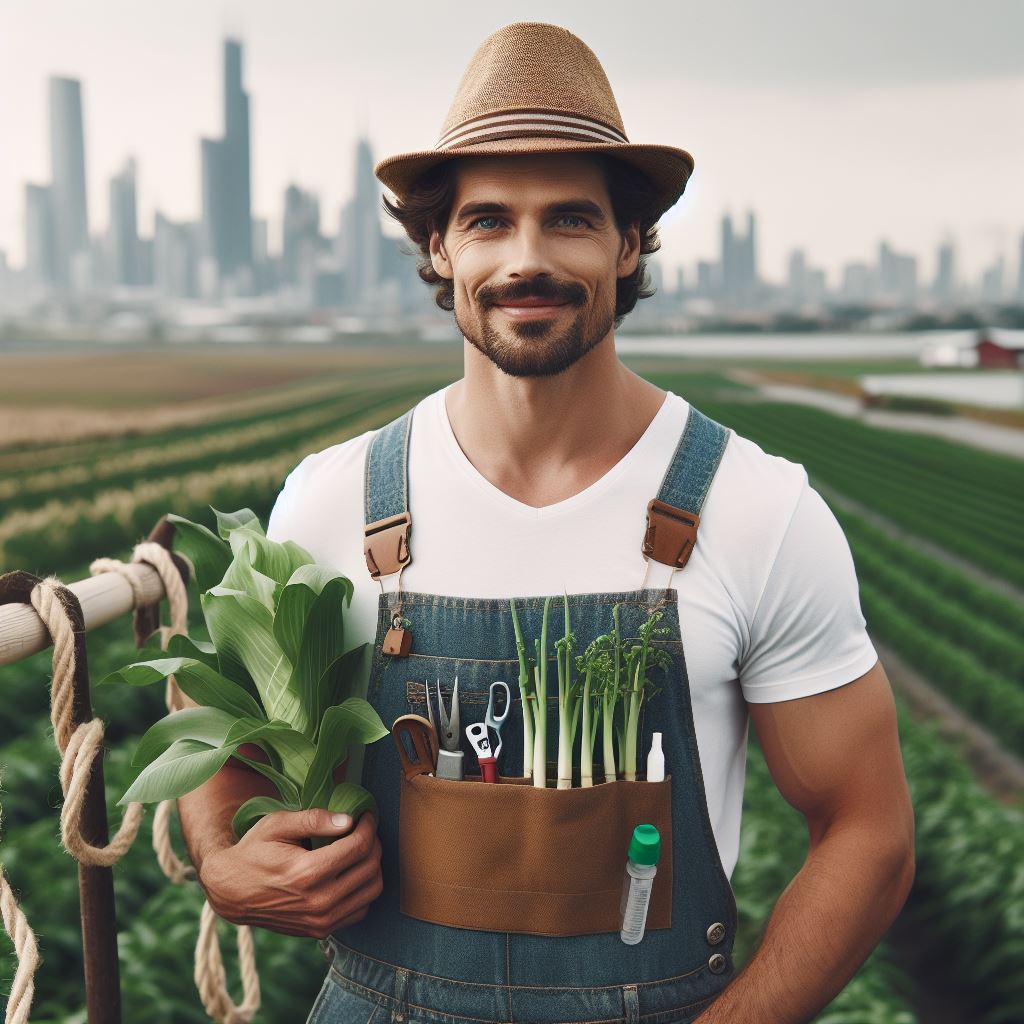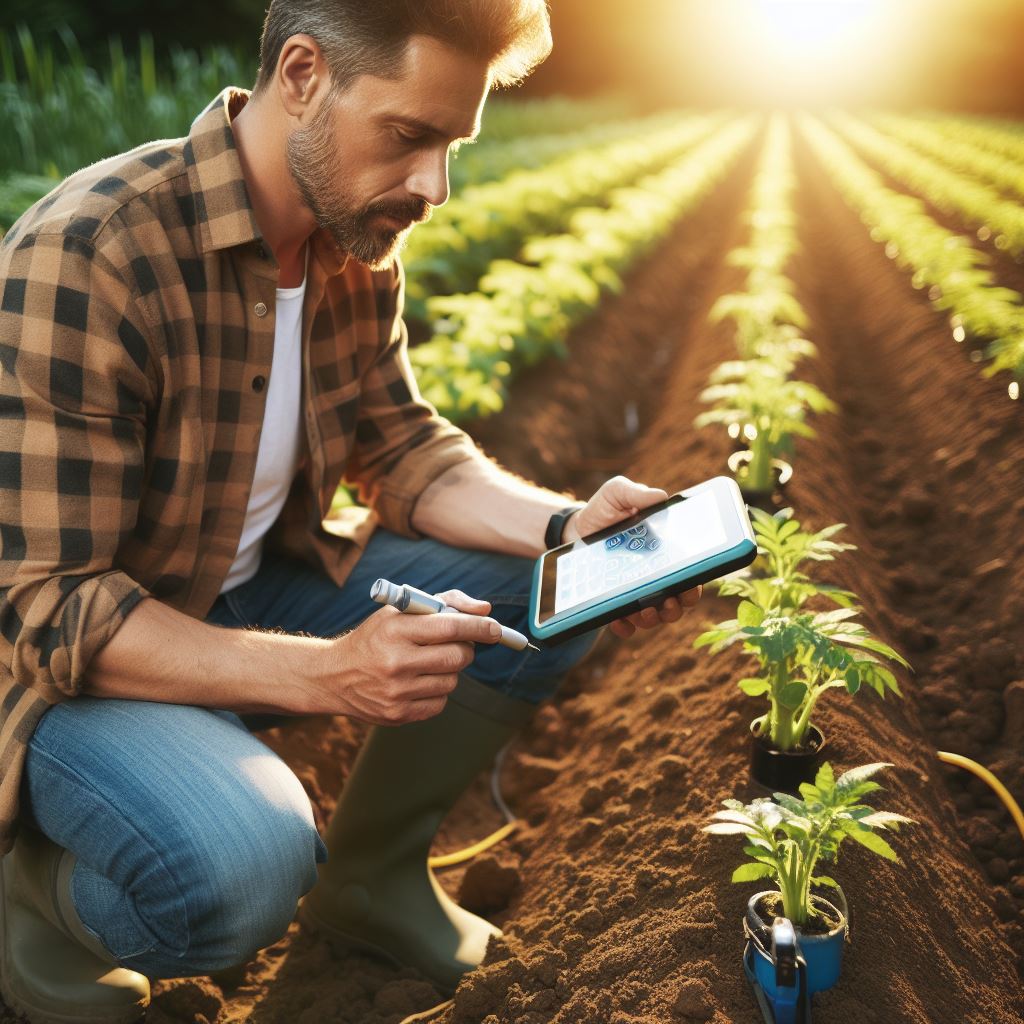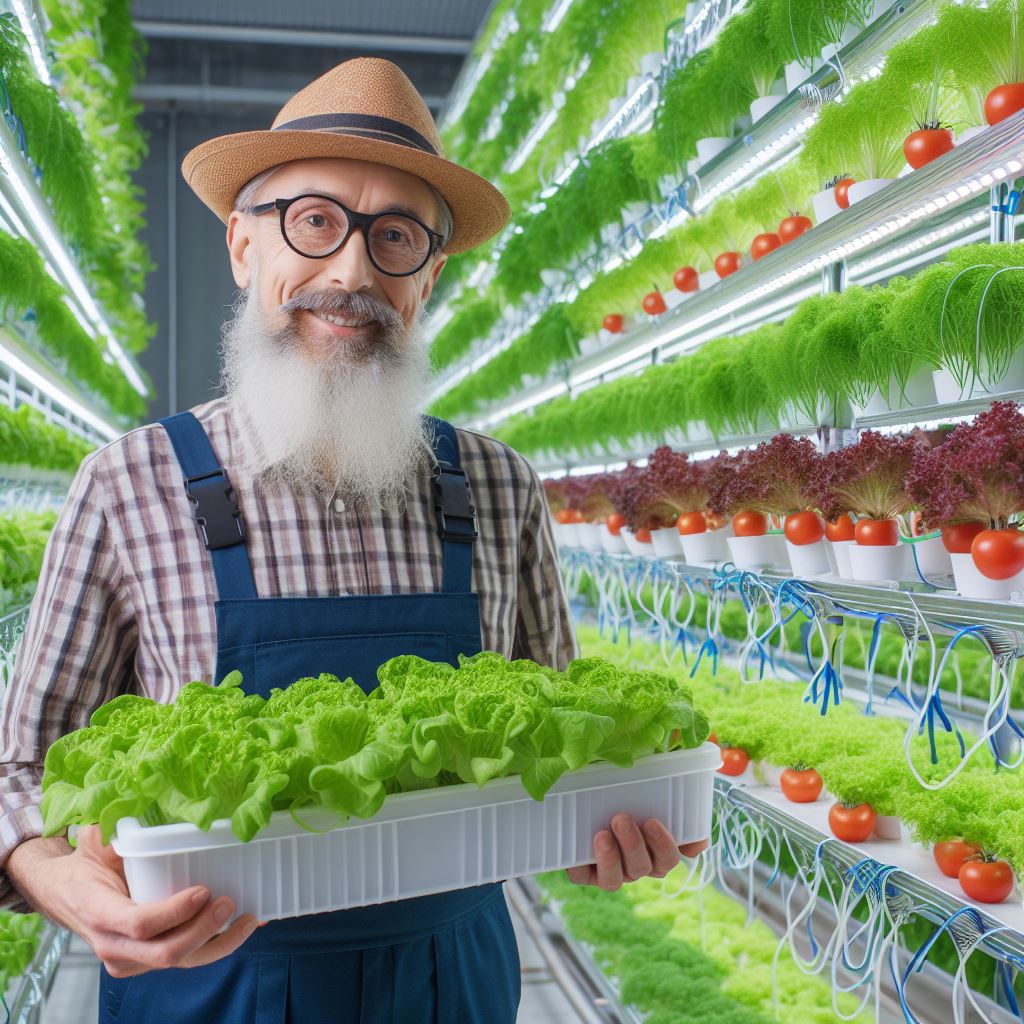Introduction
Brief explanation of organic farming
Organic farming is a method of agricultural production that focuses on sustainability and natural practices.
It avoids the use of synthetic fertilizers, pesticides, and genetically modified organisms. Instead, it relies on techniques such as crop rotation, composting, and biological pest control.
By prioritizing the health of the soil and the ecosystem, organic farming aims to produce nutritious and environmentally friendly food.
Importance of technology in organic farming
Technology has become increasingly important in organic farming.
It helps farmers improve efficiency and yields while minimizing environmental impact.
For instance, precision agriculture uses advanced sensors and data analysis to optimize irrigation, fertilizer application, and pest management.
This allows farmers to reduce resource waste and precisely meet the needs of each crop.
In addition, technology aids in monitoring and automation.
Drones equipped with imaging sensors can provide valuable insights on crop health, allowing farmers to detect diseases and nutrient deficiencies earlier.
Automated systems for irrigation and climate control ensure optimal conditions for plant growth.
These advancements help organic farmers make informed decisions and improve productivity.
Furthermore, technology facilitates communication and knowledge-sharing among farmers.
Online platforms and mobile applications allow farmers to access information, exchange experiences, and receive support from experts.
This collaboration fosters innovation and continuous improvement in organic farming practices.
Basically, technology is crucial for the advancement of organic farming.
Transform Your Agribusiness
Unlock your farm's potential with expert advice tailored to your needs. Get actionable steps that drive real results.
Get StartedIt enables farmers to enhance productivity, reduce environmental impact, and connect with a wider community.
Embracing technological advancements can further promote the growth and sustainability of organic agriculture, ultimately benefiting both farmers and consumers.
Advancements in Soil Management
In this section on advancements in soil management, we will discuss the latest technologies and techniques that are revolutionizing organic farming.
These advancements are enabling farmers to optimize their soil health and fertility, leading to higher yields and more sustainable practices.
Precision soil testing
- Precision soil testing involves using state-of-the-art equipment to analyze soil samples.
- This technology provides farmers with detailed information about their soil composition, including nutrient levels and pH.
- By understanding the specific needs of their soil, farmers can make precise adjustments to ensure optimal crop growth.
- Precision soil testing also helps in reducing unnecessary fertilizer applications, thus minimizing environmental impact and cost.
Soil fertility management systems
- Traditional organic farming relied on natural fertilizers such as compost and manure.
- However, advancements in soil fertility management systems have expanded farmers’ options.
- Now, farmers can use advanced organic fertilizers that are tailored to meet the specific nutrient requirements of different crops.
- These fertilizers are designed to release nutrients gradually, ensuring long-lasting fertility and reducing nutrient runoff.
- Additionally, soil fertility management systems include the use of cover crops and crop rotation to maintain nutrient levels and improve soil structure.
Soil health monitoring tools
- Monitoring soil health is crucial for sustainable farming practices.
- Traditional methods of visual inspection and manual testing are time-consuming and less accurate.
- However, with the advent of soil health monitoring tools, farmers can now assess their soil’s physical, chemical, and biological properties more efficiently.
- These tools include soil moisture sensors, which help farmers optimize irrigation and prevent waterlogging or drought stress.
- Soil temperature probes allow farmers to monitor temperature variations that can impact crop growth.
- Soil respiration meters provide insights into microbial activity and organic matter decomposition, indicating overall soil health.
By integrating precision soil testing, soil fertility management systems, and soil health monitoring tools, organic farmers can make informed decisions.
These advancements enable them to optimize their farming practices, increase productivity, and promote long-term sustainability.
Benefits of these advancements in soil management
The benefits of these advancements in soil management are manifold.
First and foremost, they allow farmers to tailor their farming practices to the specific needs of their soil.
This precision reduces the wastage of valuable resources such as fertilizers and water.
Moreover, by optimizing soil health and fertility, these advancements contribute to increased crop yields and improved crop quality.
Farmers can now grow healthier and more resilient crops, reducing the need for chemical pesticides and fertilizers.
Furthermore, these advancements have environmental benefits.
By minimizing nutrient runoff and improving soil structure, they help prevent soil erosion and protect water bodies from contamination.
Generally, advancements in soil management have revolutionized organic farming.
Precision soil testing, soil fertility management systems, and soil health monitoring tools have enabled farmers to make informed decisions and optimize their farming practices.
These advancements contribute to increased productivity, improved crop quality, and long-term sustainability.
Embracing these technologies is essential for the future of organic farming and ensuring a healthier planet.
Read: Agri Drones: Changing the Farming Landscape
Enhancement of Pest and Disease Control
Automated pest monitoring and detection systems
In recent years, the field of organic farming has witnessed remarkable advancements in the area of pest and disease control.
One of the most significant developments has been the introduction of automated pest monitoring and detection systems.
These technological tools provide farmers with real-time data on pest populations and help them make informed decisions regarding pest control strategies.
By monitoring pest activity through sensors, cameras, and other devices, farmers can detect and respond to pest outbreaks promptly.
Biocontrol agents and natural remedies
Another critical advancement in organic farming is the use of biocontrol agents and natural remedies in pest and disease control.
Instead of relying on chemical pesticides, organic farmers are now utilizing beneficial insects, nematodes, and microorganisms to combat pests.
Showcase Your Farming Business
Publish your professional farming services profile on our blog for a one-time fee of $200 and reach a dedicated audience of farmers and agribusiness owners.
Publish Your ProfileThese biocontrol agents help in controlling pest populations naturally and without harming the environment.
Additionally, natural remedies such as plant extracts and biopesticides derived from natural sources are being used as effective alternatives to synthetic chemicals.
Integrated pest management (IPM) technologies
Integrated Pest Management (IPM) technologies have also played a significant role in enhancing pest and disease control in organic farming.
IPM is a holistic approach that combines various pest control strategies to minimize the use of pesticides.
It involves monitoring pest populations, setting action thresholds, implementing preventive measures, and employing cultural, mechanical, and biological controls.
By integrating multiple pest management techniques, organic farmers can effectively control pests while minimizing potential risks to human health and the environment.
Benefits
- Real-time data on pest populations for informed decision-making.
- Natural and sustainable pest control methods without reliance on chemical pesticides.
- Less harm to beneficial insects, birds, and other organisms in the environment.
- Reduced health risks for farmers and consumers by minimizing pesticide exposure.
- Preservation of soil health and fertility through the avoidance of synthetic chemicals.
- Improved cost-effectiveness as a result of reduced reliance on expensive pesticides.
- Enhanced biodiversity on farms by promoting the presence of beneficial insects and organisms.
- Reduced environmental pollution through the elimination of chemical residues in soil and water.
- Long-term sustainability of farming practices by maintaining ecological balance and natural ecosystem services.
- Meeting consumer demand for healthier and more environmentally friendly food products.
The enhancement of pest and disease control in organic farming has been greatly benefited by the advancements of automated pest monitoring systems, the use of biocontrol agents and natural remedies, and the implementation of integrated pest management technologies.
These advancements not only improve the effectiveness of pest control but also contribute to the long-term sustainability of organic farming practices.
By adopting these technologies, organic farmers can mitigate the negative impacts of pests and diseases while protecting the environment and ensuring the production of safe and healthy food for consumers.
Read: Eco-Friendly Farming: Top Sustainable Practices
Improvements in Crop Nutrition
Achieving optimal crop nutrition is crucial for organic farmers.
Fortunately, advancements in technology have opened up new possibilities for enhancing nutrient management, delivery, and effectiveness.
Real-time nutrient management systems
- Real-time nutrient sensors provide farmers with accurate and immediate data on crop nutrient levels.
- This allows farmers to adjust fertilizer application rates and timing based on actual crop needs.
- By avoiding over or under fertilization, real-time nutrient management systems promote crop health and minimize environmental impact.
- These systems also save farmers time and money by preventing unnecessary fertilizer application.
- Farmers can integrate real-time nutrient sensors into their irrigation systems for targeted nutrient delivery.
Biostimulants and organic fertilizers
- Biostimulants are substances that enhance plant growth, development, and nutrient uptake without providing direct nutrition.
- Organic farmers are increasingly utilizing biostimulants as an alternative to synthetic fertilizers.
- Biostimulants can improve nutrient uptake efficiency, increase stress tolerance, and enhance overall crop performance.
- Organic fertilizers, such as compost and manure, provide essential nutrients in a slow-release form.
- They improve soil structure, water retention, and nutrient availability, promoting long-term soil fertility.
Nutrient delivery technologies
- Drip irrigation systems allow precise and controlled delivery of nutrients directly to the roots.
- This minimizes nutrient loss through leaching and volatilization, ensuring optimal nutrient utilization.
- Fertigation systems combine irrigation and fertilization, delivering nutrients directly through the irrigation system.
- These systems provide targeted nutrient application, reducing waste and improving nutrient efficiency.
- Furthermore, precision agriculture technologies enable farmers to apply nutrients with greater accuracy.
In short, advancements in crop nutrition have revolutionized organic farming.
The integration of real-time nutrient management systems, biostimulants, organic fertilizers, and nutrient delivery technologies has significantly improved nutrient management practices.
These advancements empower farmers to efficiently meet their crops’ nutrient requirements, leading to healthier plants and higher yields.
By minimizing environmental impacts and optimizing nutrient utilization, organic farming continues to evolve as a sustainable and viable agricultural practice.
Read: Smart Farming: Revolutionizing Agriculture Tech

Automation in Organic Farming
Robotic technologies for planting and harvesting
- Robotic seeders and transplanters are being developed to increase efficiency and accuracy in the planting process.
- Harvesting robots are being used to pick fruits and vegetables, reducing labor costs and ensuring gentle handling of produce.
- These technologies enable farmers to plant and harvest crops faster, resulting in higher yields and reduced manual labor.
Automated irrigation and water management
- Sensor-based irrigation systems help monitor soil moisture levels, allowing farmers to optimize water usage and minimize waste.
- Smart sprinklers and drip irrigation systems deliver water directly to the roots, reducing water evaporation and improving efficiency.
- Automated systems can be programmed to adjust watering schedules based on weather forecasts and crop-specific needs.
Data-driven decision-making systems
- Farm management software collects and analyzes data on soil health, weather patterns, and crop growth to provide actionable insights.
- This data-driven approach helps farmers make informed decisions on pest management, fertilizer application, and crop rotation.
- Decision-making systems also enable real-time monitoring of crop health and early detection of diseases or pest infestations.
Essentially, automation in organic farming is revolutionizing the industry by improving efficiency, reducing manual labor, and maximizing yields.
By embracing robotic technologies for planting and harvesting, farmers can save time and resources, resulting in increased productivity.
Automated irrigation and water management systems ensure optimal water usage, leading to conservation and reduced costs.
Moreover, data-driven decision-making systems empower farmers with valuable insights for effective planning and management.
As technology continues to advance, organic farming will become even more sustainable, productive, and environmentally friendly.
Read: Data-Driven Farming: A Closer Look
Integration of Artificial Intelligence (AI)
In recent years, there has been a significant integration of Artificial Intelligence (AI) in organic farming, revolutionizing the industry.
This section explores some of the exciting advancements that AI brings to the table.
AI-powered crop disease diagnosis
- AI technologies can identify and diagnose crop diseases accurately and efficiently.
- By analyzing images of diseased plants, AI algorithms can identify specific diseases with high precision.
- This enables farmers to take timely action, preventing the further spread of diseases within their crops.
- The integration of AI-powered crop disease diagnosis minimizes losses and ensures sustainable organic farming practices.
Predictive analytics for yield optimization
- AI utilizes predictive analytics to optimize crop yields for organic farmers.
- By analyzing various factors like weather patterns, soil quality, and historical data, AI algorithms can provide accurate yield predictions.
- This helps farmers make informed decisions regarding planting, fertilizing, and harvesting timelines.
- By optimizing yields, organic farmers can increase productivity and maximize their profits while minimizing resource wastage.
AI-driven farm management systems
- AI-driven farm management systems assist organic farmers in automating and streamlining their daily operations.
- These systems can schedule tasks, monitor soil and crop health, and control irrigation and fertilization processes.
- By collecting real-time data from sensors and drones, AI can analyze and provide valuable insights to optimize farm operations.
- This allows farmers to make data-driven decisions, reduce manual labor, and improve overall efficiency.
Benefits of integrating AI in organic farming
Integration of AI in organic farming presents numerous benefits to farmers, consumers, and the environment.
With AI-powered crop disease diagnosis, farmers can promptly identify and combat diseases, safeguarding their crops and ensuring healthy produce for consumers.
Optimizing resource allocation and increasing farm productivity
Predictive analytics for yield optimization empower farmers to make precise decisions, optimizing resource allocation and increasing farm productivity.
This not only benefits the farmer’s profitability but also ensures sustainable farming practices.
Make informed decisions
AI-driven farm management systems automate routine tasks and provide real-time data, enabling farmers to make informed decisions.
By reducing manual labor and increasing efficiency, organic farmers can focus on sustainable practices and minimize environmental impact.
Challenges of integrating AI in farming
However, the integration of AI in organic farming is not without challenges.
Farmers need access to reliable AI technology, which may require financial investments.
Additionally, data privacy and security are crucial factors that need to be addressed to ensure the responsible use of AI in farming.
In general, the integration of Artificial Intelligence in organic farming brings about significant advancements.
From AI-powered crop disease diagnosis to predictive analytics for yield optimization and AI-driven farm management systems, AI revolutionizes the industry.
As technology continues to progress, organic farming can thrive with increased precision, efficiency, and sustainability.
Impact of Technology on Organic Farming Sustainability
Technology advancements have brought about significant changes in organic farming practices, leading to improved sustainability and several benefits for farmers and the environment.
Reduction in chemical inputs and environmental impact
- One of the most notable impacts of technology on organic farming is the reduction in chemical inputs.
- Farmers can now utilize advanced sensing technologies to monitor crops and detect early signs of pests or diseases.
- This allows for targeted interventions, reducing the need for chemical pesticides and minimizing their environmental impact.
- Furthermore, technology-enabled precision agriculture tools help farmers apply fertilizers and nutrients only where they are needed, minimizing excessive use and potential runoff into water bodies.
- The use of biological control agents, such as biopesticides and biofungicides, has also been facilitated by technology advancements.
- These natural alternatives help control pests and diseases without the negative environmental consequences associated with synthetic chemicals.
- Overall, technology has played a significant role in lowering chemical inputs and minimizing the environmental impact of organic farming.
Water and resource conservation
- Technology has revolutionized water and resource management in organic farming systems.
- By utilizing advanced irrigation systems, farmers can optimize water usage based on crop needs and soil conditions.
- Smart irrigation controllers, soil moisture sensors, and weather monitoring tools allow for precise water scheduling, reducing wastage and conserving this valuable resource.
- Additionally, technology-driven data analytics and modeling tools assist farmers in efficient nutrient management.
- These tools consider soil composition, weather patterns, and crop requirements, ensuring optimal fertilization and reducing resource wastage.
- As a result, organic farmers can maximize their resource utilization, leading to improved sustainability and reduced environmental impact.
Increased productivity and profitability
- Technology advancements have significantly boosted productivity and profitability in organic farming.
- Precision agriculture technologies, such as drones and satellite imagery, provide real-time data on crop health and yield estimates.
- Farmers can use this information to make informed decisions, optimize resource allocation, and enhance overall farm management.
- Furthermore, automation and robotics have streamlined various farming operations, reducing labor requirements and increasing efficiency.
- Automated tasks include planting, harvesting, and sorting, enabling farmers to achieve higher levels of productivity and reduce costs.
- Technology also facilitates market access and improves traceability, allowing organic farmers to command premium prices for their products.
- Through online platforms and e-commerce, farmers can directly connect with consumers, eliminating intermediaries and increasing profitability.
In essence, technology advancements have had a profound impact on the sustainability of organic farming.
The reduction in chemical inputs and environmental impact, along with the promotion of water and resource conservation, contribute to a more sustainable agricultural system.
Showcase Your Farming Business
Publish your professional farming services profile on our blog for a one-time fee of $200 and reach a dedicated audience of farmers and agribusiness owners.
Publish Your ProfileMoreover, increased productivity and profitability offer organic farmers a competitive edge and pave the way for a prosperous future.
Embracing technology in organic farming is essential to meet the growing global demand for organic produce while ensuring environmental stewardship.
Conclusion
Recap of tech advancements in organic farming
Organic farming has seen significant technological advancements in recent years, improving various aspects of the agricultural sector.
These advancements include the development of smart irrigation systems, precision farming techniques, and remote monitoring systems.
Benefits of embracing technology in the organic farming sector
The integration of technology in organic farming has provided numerous benefits.
Farmers can enhance productivity and efficiency by utilizing real-time data, reducing water and resource wastage, and improving crop quality.
Additionally, technology enables farmers to monitor and manage their crops remotely, reducing the need for manual labor.
Encouragement for further technological advancements in the future
As technology continues to evolve, there is a need for further advancements in the organic farming sector.
Continued research and development can lead to the creation of more innovative solutions for pest and disease management, soil health improvement, and sustainable farming practices.
Embracing and investing in new technologies will be crucial for the future success and sustainability of organic farming.
In a nutshell, the incorporation of technology in organic farming has revolutionized the industry, providing farmers with advanced tools and methods to enhance productivity, reduce environmental impact, and ensure long-term sustainability.




